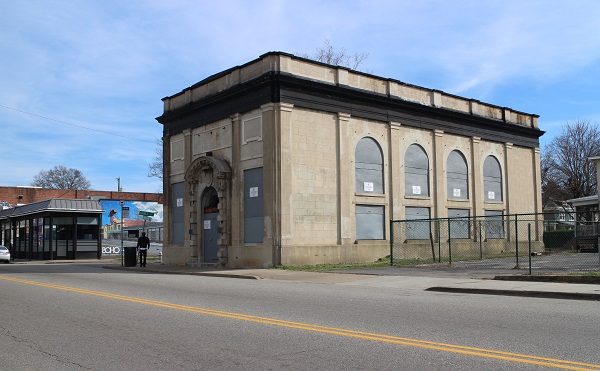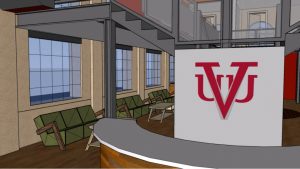
The former American National Bank Building as it appeared Tuesday. Plans to redevelop the property have dragged on for nearly four years. (Jonathan Spiers)
Scrutiny surrounding a seemingly stagnant redevelopment project on Brookland Park Boulevard has prompted a local university to sever ties with the venture.
Virginia Union University said it is no longer involved in Dixon/Lee Development Group’s plan to convert the former American National Bank Building at 201 W. Brookland Park Blvd. into a small-business development center that was planned to involve university resources and students.
Responding to inquiries from BizSense, VUU spokeswoman Pamela Cox provided a statement saying the university had decided to terminate the memorandum of understanding it signed with Dixon/Lee in 2017, and that it is assessing its relationship with the group and principal LaMar Dixon.
“To be clear, the university is not involved with the construction or financial aspects of the project,” the statement said.
“Virginia Union University fully supports economic development in Richmond, especially the Northside community. We are excited about the possibility of the American National Bank Building on Brookland Park Boulevard becoming a small business development center.”
Publicity an issue
Reached Tuesday, Dixon said he was aware of the decision but maintained that it wouldn’t prevent the project from moving forward. He said his attorney was reaching out to VUU to discuss the decision, which he said stemmed from publicity the project has received in news reports in recent weeks.
“We’ve reached out to Virginia Union to have a substantive conversation about it. What was told to me is if it looks negatively in the press, it could negatively impact the university,” Dixon said.
Cox said in her email that VUU did not have further comment on the topic beyond the statement.
Dixon had signed the MOU with VUU President Hakim Lucas, who signed the document as CEO/president of “Virginia Union University Small Business Development Center.” While not a binding contract, the MOU detailed framework for a potential binding contract, with terms that were to be valid through July 31, 2020.
Plans for the property called for a business accelerator called Urban Capital Collaborative that would involve VUU students working with small business owners to encourage economic development in the area.
“I thought that Virginia Union was a great partner from the standpoint of not only willingness but the historic nature of doing innovation in a disinvested community. I thought they were a natural fit,” Dixon said.
He said he had met and corresponded with VUU officials in recent weeks but that his attorney, Thomas Voekler with Kaplan Voekler Cunningham & Frank, had not heard back from the university since reaching out about its decision to end the MOU.
Dixon said he wanted to involve VUU in part because of his own involvement as a student at the school. He said he attended the university in the mid- to late-1990s before leaving his junior year to start a business, and he said he has since re-enrolled and is set to graduate this May with a bachelor’s degree in political science with a minor in business.
“As someone that attended the school initially and went back to the school because I believe in it and to graduate, I don’t want anything to impact my university negatively,” he said.
Scrutiny of the project has increased in recent months as neighboring property owners and fellow developers have called attention to its apparent lack of progress, four years after the City of Richmond authorized $200,000 in economic development grant funds to assist the redevelopment. Dixon bought the building four years ago for $20,000 from the Richmond Redevelopment and Housing Authority.
Behind schedule
Critics pointed to a performance agreement approved in 2015 and an amendment to that agreement in 2016 as evidence that the project had fallen behind schedule and was in default of those agreements. Dixon maintained that communications with the city had allowed for extensions to those agreements.
Documents provided to BizSense by the city in response to a Freedom of Information Act request did not include any approvals or agreements beyond the initial performance agreement and the 2016 amendment.
City officials have not responded to repeated requests for comment outside of the FOIA request. Doug Dunlap, the deputy chief administrator overseeing the economic and community development department as interim director, did not respond to calls and emails inquiring about the project’s standing with the city.
City Councilman Chris Hilbert, whose district includes the Brookland Park corridor, has not responded to repeated requests from BizSense for comment.
Hilbert told the Times-Dispatch this month that he’s disappointed that the project hasn’t progressed further but that he remains supportive of Dixon, who was described in the article as a personal friend who has received Hilbert’s support in the past.
Dixon said he met with city officials last week about how to go forward with the project from here.
“We were working on solutions about the grant per se, and we’re hoping to rectify whatever it takes to get us to the point of doing the innovation center, whatever that looks like,” he said.
Dixon said VUU’s decision to pull out of the project affects how his group will be able to leverage capital to finance remaining work. He said the group is vetting other potential collaborators.
“We’re moving forward with the project,” Dixon said. “What we’re trying to do is figure out who’s in, who’s not, and how to move forward with the project with the challenges that came up in the last couple weeks.”
Dixon said he still expects construction to start and finish this year. He previously told BizSense fencing for the project would be erected by the end of this month. No fencing was visible at the property Tuesday.

The former American National Bank Building as it appeared Tuesday. Plans to redevelop the property have dragged on for nearly four years. (Jonathan Spiers)
Scrutiny surrounding a seemingly stagnant redevelopment project on Brookland Park Boulevard has prompted a local university to sever ties with the venture.
Virginia Union University said it is no longer involved in Dixon/Lee Development Group’s plan to convert the former American National Bank Building at 201 W. Brookland Park Blvd. into a small-business development center that was planned to involve university resources and students.
Responding to inquiries from BizSense, VUU spokeswoman Pamela Cox provided a statement saying the university had decided to terminate the memorandum of understanding it signed with Dixon/Lee in 2017, and that it is assessing its relationship with the group and principal LaMar Dixon.
“To be clear, the university is not involved with the construction or financial aspects of the project,” the statement said.
“Virginia Union University fully supports economic development in Richmond, especially the Northside community. We are excited about the possibility of the American National Bank Building on Brookland Park Boulevard becoming a small business development center.”
Publicity an issue
Reached Tuesday, Dixon said he was aware of the decision but maintained that it wouldn’t prevent the project from moving forward. He said his attorney was reaching out to VUU to discuss the decision, which he said stemmed from publicity the project has received in news reports in recent weeks.
“We’ve reached out to Virginia Union to have a substantive conversation about it. What was told to me is if it looks negatively in the press, it could negatively impact the university,” Dixon said.
Cox said in her email that VUU did not have further comment on the topic beyond the statement.
Dixon had signed the MOU with VUU President Hakim Lucas, who signed the document as CEO/president of “Virginia Union University Small Business Development Center.” While not a binding contract, the MOU detailed framework for a potential binding contract, with terms that were to be valid through July 31, 2020.
Plans for the property called for a business accelerator called Urban Capital Collaborative that would involve VUU students working with small business owners to encourage economic development in the area.
“I thought that Virginia Union was a great partner from the standpoint of not only willingness but the historic nature of doing innovation in a disinvested community. I thought they were a natural fit,” Dixon said.
He said he had met and corresponded with VUU officials in recent weeks but that his attorney, Thomas Voekler with Kaplan Voekler Cunningham & Frank, had not heard back from the university since reaching out about its decision to end the MOU.
Dixon said he wanted to involve VUU in part because of his own involvement as a student at the school. He said he attended the university in the mid- to late-1990s before leaving his junior year to start a business, and he said he has since re-enrolled and is set to graduate this May with a bachelor’s degree in political science with a minor in business.
“As someone that attended the school initially and went back to the school because I believe in it and to graduate, I don’t want anything to impact my university negatively,” he said.
Scrutiny of the project has increased in recent months as neighboring property owners and fellow developers have called attention to its apparent lack of progress, four years after the City of Richmond authorized $200,000 in economic development grant funds to assist the redevelopment. Dixon bought the building four years ago for $20,000 from the Richmond Redevelopment and Housing Authority.
Behind schedule
Critics pointed to a performance agreement approved in 2015 and an amendment to that agreement in 2016 as evidence that the project had fallen behind schedule and was in default of those agreements. Dixon maintained that communications with the city had allowed for extensions to those agreements.
Documents provided to BizSense by the city in response to a Freedom of Information Act request did not include any approvals or agreements beyond the initial performance agreement and the 2016 amendment.
City officials have not responded to repeated requests for comment outside of the FOIA request. Doug Dunlap, the deputy chief administrator overseeing the economic and community development department as interim director, did not respond to calls and emails inquiring about the project’s standing with the city.
City Councilman Chris Hilbert, whose district includes the Brookland Park corridor, has not responded to repeated requests from BizSense for comment.
Hilbert told the Times-Dispatch this month that he’s disappointed that the project hasn’t progressed further but that he remains supportive of Dixon, who was described in the article as a personal friend who has received Hilbert’s support in the past.
Dixon said he met with city officials last week about how to go forward with the project from here.
“We were working on solutions about the grant per se, and we’re hoping to rectify whatever it takes to get us to the point of doing the innovation center, whatever that looks like,” he said.
Dixon said VUU’s decision to pull out of the project affects how his group will be able to leverage capital to finance remaining work. He said the group is vetting other potential collaborators.
“We’re moving forward with the project,” Dixon said. “What we’re trying to do is figure out who’s in, who’s not, and how to move forward with the project with the challenges that came up in the last couple weeks.”
Dixon said he still expects construction to start and finish this year. He previously told BizSense fencing for the project would be erected by the end of this month. No fencing was visible at the property Tuesday.

It’s time for Dixon to renegotiate with the city admit his mistakes and do a mixed use historic tax credit project , which is what should have been done intially. Put 6 studio/one bedrooms on the second floor and commercial on the first floor with a rooftop deck. Otherwise let some one else do it.